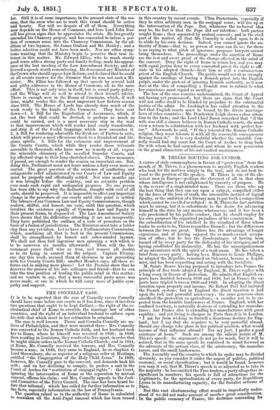THE CONNELLY CASE.
IT is to be regretted that the case of Connelly versus Connelly should have come before our courts as it has done, since it involves two questions that ought to be kept distinct,—the right of the ec- clesiastical chief of Rome to override the marriage law of other countries, and the right of an individual husband to enforce upon his wife that which must in her estimation be criminal.
The ease is well known. Pierce and Cornelia Connelly are na- tives of Philadelphia, and they were married there : Mrs. Connelly was converted to the Roman Catholic faith, and her husband took her to Rome, where he himself was received in 1836 ; in 1840, then residing in Louisiana, they resolved to live apart, in order that he might obtain orders in the Roman Catholic Church ; and in 1844, at Rome, Mr. Connelly received the tonsure, and Mrs. Connelly became •a nun; in 1846, they came to England, he as chaplain to Lord Shrewsbury, she as superior of a religious order at Hastings, entitled " the Congregation of the Holy Child Jesus." In 1848, however, Mr. Connelly goes to the convent, and demands back his wife ; and on her declining to comply, he prefers a suit in the Court of Arches for " restitution of conjugal rights ": the Court, ignoring the intervention of Rome or the separation by mutual consent, affirms his claim ; and Mrs. Connelly appeals to the Judi- cial Committee of the Privy Council. The case hasbeen heard be- fore that tribunal ; which has called for further information as to the facts, especially information on the law of Pennsylvania. The question raised as to the authority of Rome is calculated to reawaken all the Anti-Papal rancour which has been roused in this country by recent events. Ultra Protestants, especially if they be ultra arbitrary men in the conjugal sense, will fire up at the intervention of the Pope. But, whatever the technical idea may be, the fact is that the Pope did not interfere : both parties sought Rome ; they separated by mutual consent ; and iu the civil part of the matter, all that Mr. Connelly is called upon to do is to abide by his own decision. Indeed, you cannot ignore the au- thority of Rome—that is, no person of sense can do so ; for there is no saying to what pitch of ignorance prepense lawyers cannot bring themselves. The proceedings under the sanction of Rome are the test and overt proof of the change effected in the mind of the convert. Deny the right of Rome to retain her, and you may with equal justice deny to every converted priest the right to offi- ciate in his adopted church—treat him as still a contumacious priest of the English Church. The public would revolt as strongly against the sacrilege of forcing a Romish priest into the English pulpit, under the pretext of ignoring Romish authority, as it now • does at the idea of compelling a Romish nun to submit to what her conscience must regard as sacrilege.
The law of the case remains undetermined, the Court of Appeal not having yet pronounced ; but there are signs that the Court will not suffer itself to be blinded by prejudice to the substantial justice of the affair. Dr. Lushington has called attention to the fact that English courts must be bound by the divers -marriage- laws of other countries ; Mr. Pemberton Leigh shows a close atten- tion to the facts ; and the Lord Chief Baron remarked that " if the wife was still a sincere believer in Roman Catholic tenets, she must view a return to cohabitation with her husband with perfect hor- ror." Afterwards he said, "If they tolerated the Roman Catholic religion, they must tolerate it with all the reasonable consequences flowing from it." It is very doubtful whether the unstable Con- nelly would find any court but the Court of Arches to drag back the wife whom he had surrendered, and whom he now persecutes in the grand climacteric of his not exalted uxoriousness.


























 Previous page
Previous page